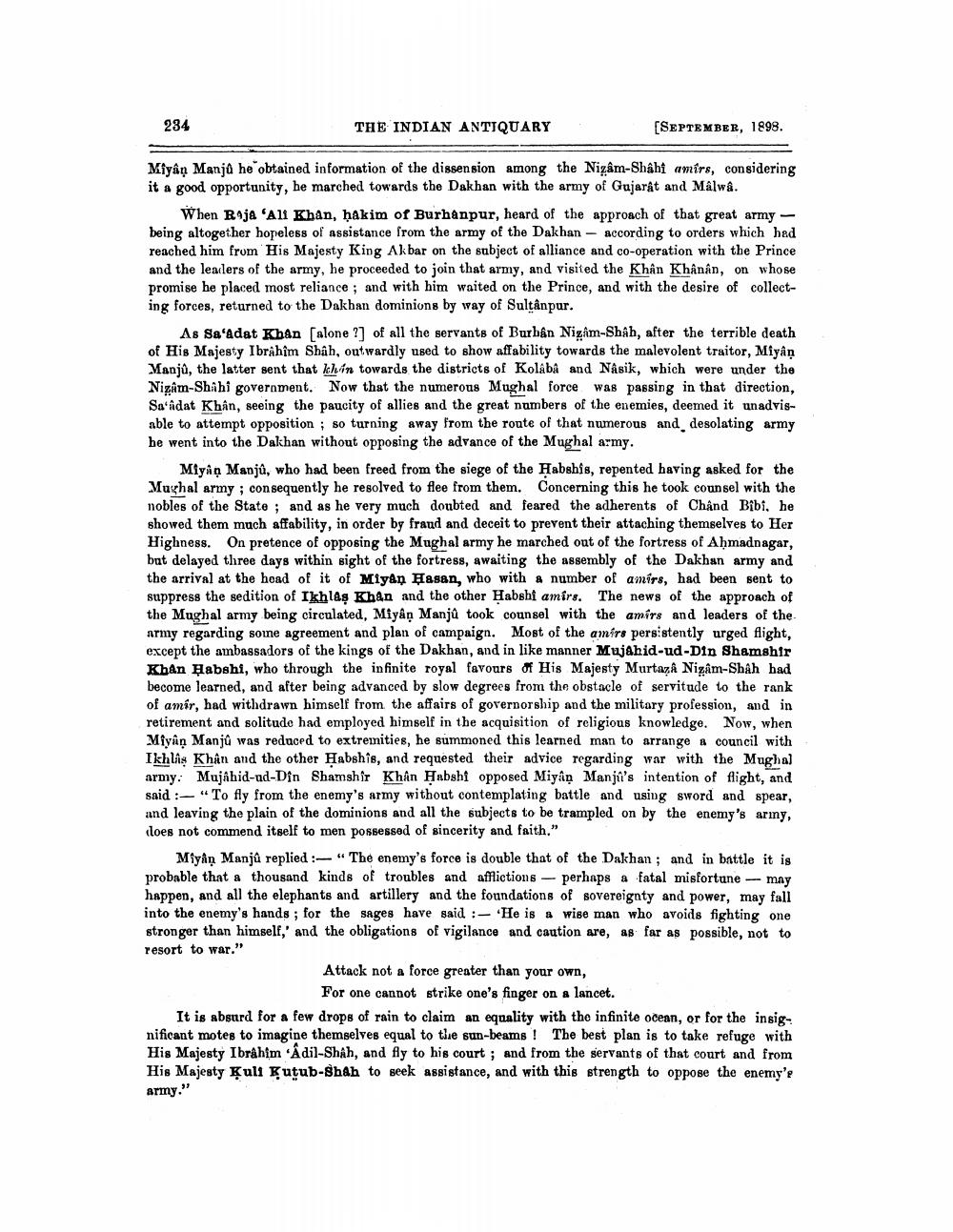________________
234
THE INDIAN ANTIQUARY
[SEPTEMBER, 1898.
Miyan Manjû he obtained information of the dissension among the Nizâm-Shahi amirs, considering it a good opportunity, he marched towards the Dakhan with the army of Gujarat and Mâlwâ.
When Raja 'Ali Khan, hakim of Burhanpur, heard of the approach of that great armybeing altogether hopeless of assistance from the army of the Dakhan according to orders which had reached him from His Majesty King Akbar on the subject of alliance and co-operation with the Prince and the leaders of the army, he proceeded to join that army, and visited the Khân Khânân, on whose promise he placed most reliance; and with him waited on the Prince, and with the desire of collecting forces, returned to the Dakhan dominions by way of Sultanpur.
As Sa'adat Khân [alone ?] of all the servants of Burhân Nizam-Shah, after the terrible death of His Majesty Ibrahim Shah, outwardly used to show affability towards the malevolent traitor, Miyân Manjû, the latter sent that khin towards the districts of Kolâbâ and Nasik, which were under the Nizam-Shahi government. Now that the numerous Mughal force was passing in that direction, Sa âdat Khân, seeing the paucity of allies and the great numbers of the enemies, deemed it unadvisable to attempt opposition; so turning away from the route of that numerous and desolating army he went into the Dakhan without opposing the advance of the Mughal army.
Miyan Manju, who had been freed from the siege of the Ḥabshis, repented having asked for the Mughal army; consequently he resolved to flee from them. Concerning this he took counsel with the nobles of the State; and as he very much doubted and feared the adherents of Chând Bibi, he showed them much affability, in order by fraud and deceit to prevent their attaching themselves to Her Highness. On pretence of opposing the Mughal army he marched out of the fortress of Ahmadnagar, but delayed three days within sight of the fortress, awaiting the assembly of the Dakhan army and the arrival at the head of it of Miyan Hasan, who with a number of amirs, had been sent to suppress the sedition of Ikhlas Khan and the other Habshi amirs. The news of the approach of the Mughal army being circulated, Miyân Manjû took counsel with the amirs and leaders of the army regarding some agreement and plan of campaign. Most of the amirs persistently urged flight, except the ambassadors of the kings of the Dakhan, and in like manner Mujahid-ud-Din Shamshir Khan Habshi, who through the infinite royal favours of His Majesty Murtaza Nizâm-Shâh had become learned, and after being advanced by slow degrees from the obstacle of servitude to the rank of amir, had withdrawn himself from the affairs of governorship and the military profession, and in retirement and solitude had employed himself in the acquisition of religious knowledge. Now, when Miyan Manjû was reduced to extremities, he summoned this learned man to arrange a council with Ikhlas Khan and the other Habshis, and requested their advice regarding war with the Mughal army: Mujahid-ud-Din Shamshir Khan Habshi opposed Miyân Manji's intention of flight, and said: "To fly from the enemy's army without contemplating battle and using sword and spear, and leaving the plain of the dominions and all the subjects to be trampled on by the enemy's army, does not commend itself to men possessed of sincerity and faith."
Miyan Manjû replied: "The enemy's force is double that of the Dakhan; and in battle it is probable that a thousand kinds of troubles and afflictions perhaps a fatal misfortune may happen, and all the elephants and artillery and the foundations of sovereignty and power, may fall into the enemy's hands; for the sages have said: 'He is a wise man who avoids fighting one stronger than himself,' and the obligations of vigilance and caution are, as far as possible, not to resort to war."
Attack not a force greater than your own,
For one cannot strike one's finger on a lancet.
—
It is absurd for a few drops of rain to claim an equality with the infinite ocean, or for the insignificant motes to imagine themselves equal to the sun-beams! The best plan is to take refuge with His Majesty Ibrahim Adil-Shah, and fly to his court; and from the servants of that court and from His Majesty Ķuli Kutub-Shah to seek assistance, and with this strength to oppose the enemy's army."




